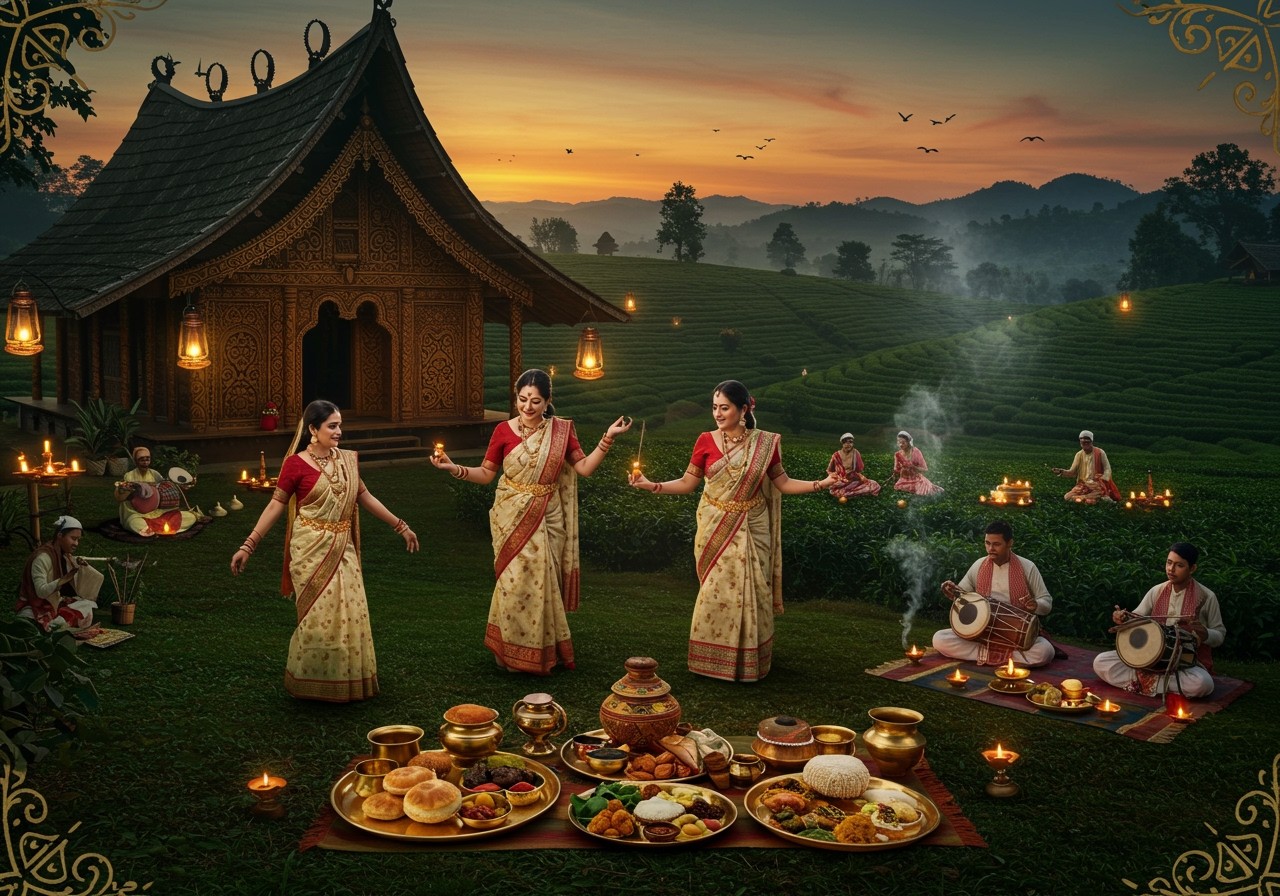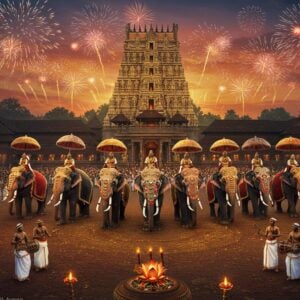
Upper Assam, a land of vibrant traditions and lush landscapes, beckons travelers to delve into its rich cultural heritage. As we journey into 2025, this guide unveils the heart of Upper Assam, from its joyous festivals to its time-honored customs. Discover what makes this region a significant thread in India’s diverse cultural tapestry, and witness how age-old traditions continue to thrive while embracing the present.
Festivals of Upper Assam: A Celebration of Life
The spirit of Upper Assam truly comes alive during its festivals. The most prominent of these is Bihu, a celebration deeply intertwined with the agricultural cycle and the Assamese New Year. Celebrated three times a year, each Bihu festival holds unique significance:
- Bohag Bihu (Rongali Bihu): Welcoming the Assamese New Year in mid-April (around the 14th), Rongali Bihu is a vibrant celebration of spring and renewal. The air is filled with music, the rhythmic beats of the dhol, and the graceful movements of the Bihu dance. Families gather for feasts, strengthening bonds and sharing the joy of new beginnings.
- Magh Bihu (Bhogali Bihu): As the harvest season concludes in January (around the 15th), Bhogali Bihu is a time for expressing gratitude for nature’s bounty. Bonfires, known as Meji, blaze under the night sky, symbolizing the burning away of the old year. Community feasts, featuring traditional delicacies like pitha and laru, bring people together in a spirit of shared abundance.
- Kati Bihu: Observed in October (around the 18th), Kati Bihu is a more solemn occasion marking the sowing season. Lamps are lit to protect the crops and prayers are offered for a bountiful harvest in the coming year. It’s a time of quiet reflection and hope for the future.
Beyond Bihu, Upper Assam is home to a host of other unique festivals. The Ambubachi Mela, held at the Kamakhya Temple in Guwahati from June 22nd to 26th, is a significant pilgrimage attracting devotees from across the country. The Baishagu Festival, celebrated by the Bodo Kacharis community from April 14th to 16th, is a vibrant spectacle of color, music, and the graceful Bagurumba dance.
For those seeking authentic ritual items for these auspicious occasions, Poojn.in offers a wide selection of puja essentials, delivered right to your doorstep.
Culinary Delights: A Taste of Assam
Assamese cuisine is a true reflection of the region’s diverse cultural influences. Rice and fish form the heart of many dishes, and the use of local herbs and spices creates a unique flavor profile. Some must-try delicacies include:
- Masor Tenga: This tangy fish curry, a staple in Assamese households, perfectly balances sourness and spice. The use of tomatoes and various souring agents creates a refreshing and flavorful dish.
- Pitha: These traditional rice cakes, often enjoyed during festivals, come in a variety of forms, both sweet and savory. From the steamed til pitha to the fried ghila pitha, each variety offers a unique taste and texture.
Explore the rich culinary traditions of the Mishing, Ahom, and Deori communities, each offering distinct flavors and cooking techniques. The use of bamboo and banana leaves in cooking adds an earthy aroma to many dishes. And, of course, no visit to Upper Assam is complete without experiencing the region’s renowned tea culture. Poojn.in also provides a range of traditional ingredients to help you recreate these authentic flavors at home.
Surnames: Whispers of History
Surnames in Upper Assam offer a glimpse into the region’s history and social structures. Common Assamese surnames often reflect ancestral occupations, tribal affiliations, or connections to the Ahom kingdom:
- Saikia, Baruah: These surnames are associated with administrative roles within the Ahom kingdom, revealing a rich historical legacy.
- Tribal Surnames: The indigenous tribes of Upper Assam, such as the Misings and Bodos, have their own unique surnames that reflect their distinct cultural identities. These surnames are often passed down through matrilineal or patrilineal systems, showcasing the diverse family structures within the region.
Understanding the significance of these surnames can provide valuable insights into the social fabric of Upper Assam. They serve as a reminder of the region’s rich history and the diverse communities that have shaped its identity.
Preserving Heritage in a Modern World
In today’s rapidly changing world, Upper Assam remains deeply committed to preserving its cultural heritage. Efforts to promote and protect traditions are evident in the continued celebration of festivals, educational initiatives, and the growing use of digital platforms to share cultural knowledge:
- Festivals and Cultural Events: These events serve as vital platforms for passing down traditions to younger generations and fostering cultural exchange within and beyond the region. They provide a space for community members to connect with their roots and celebrate their shared heritage.
- Educational Programs: Educational initiatives play a crucial role in raising awareness among younger generations about the importance of preserving their cultural heritage. These programs offer insights into traditional arts, crafts, music, and dance, ensuring that these valuable skills are not lost to time.
- Digital Platforms: The digital age has provided new avenues for sharing and celebrating Assamese culture globally. Online platforms connect communities, enabling them to share stories, document traditions, and promote awareness of Upper Assam’s unique cultural gems. This ensures that even amidst modernization, the spirit of Assam continues to thrive and reach wider audiences.
From the vibrant colors of Bihu to the tantalizing aromas of its cuisine, Upper Assam offers a rich cultural experience. As we move forward into 2025, the region continues to embrace progress while honoring its roots, ensuring that its cultural legacy remains vibrant for generations to come. For a deeper dive into Assamese rituals and traditions, explore articles like “Dhekiakhowa Bornamghar: Rituals and Practices Explained” and “Assam’s Sacred Sites: Ugratara Devalaya and Other Spiritual Journeys” on Poojn.in. You can also find traditional items for your puja needs here.


